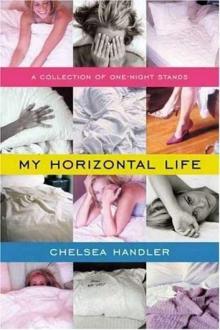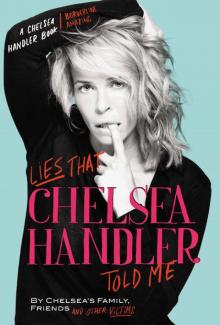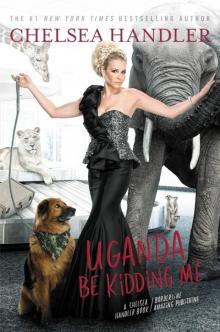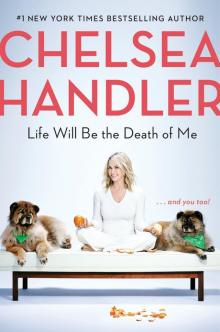- Home
- Chelsea Handler
Life Will Be the Death of Me Page 8
Life Will Be the Death of Me Read online
Page 8
“What was he punishing you for?”
“Everything and nothing. He just hated me. Well, I mean, I know he didn’t hate me, but that’s what it felt like.”
“And what did that feel like?” Dan leaned forward, his forearms on his knees, hands clasped.
“I just told you, Miracle-Ear. Like he hated me.” I didn’t call Dan “Miracle-Ear,” but I thought about it.
“But what did that feel like?”
Dan did this a lot. Asked me a question I had already answered.
He wanted me to understand that the outward feeling was not the only feeling. He pushed me to identify what was underneath that feeling, which was anger, and then sadness, and then rejection. I felt alone. That I couldn’t rely on anyone but myself. Helpless.
Now, I know that my stubbornness was patrilineal—that it came directly from the person who had withdrawn his affection. If he still loved me, he wasn’t about to tell me, and I surely wasn’t going to ask him to love me. Two obstinate assholes reeling in pain. Things could have been so much easier if we had just had the ability to reach out to each other.
“Our signals were always crossed,” I told Dan. “None of us had the tools.”
“That’s why you’re here,” he told me. “To get the tools.”
“I definitely remember loving my father before Chet died, and not loving him after, so there’s that,” I added.
“Well, you probably loved him still, but you were hurt, and it sounds like you turned that hurt into anger, because, as I said, anger is motion, and it allows you to avoid sitting with your feelings. In a sense, you felt that your father had broken up with you too. That must have been really scary for a little girl.”
Getting broken up with twice by the age of nine. I had never looked at it that way.
“Yeah, that’s a lot of male rejection before I even got my period.”
Two guys in the span of one year, and I hadn’t even started dating. I had on no occasion thought about my experiences within this kind of framework, or thought about how my father must have felt losing his firstborn son. Of course he was wrecked. Who wouldn’t be? Why would he have any inkling about how to handle losing a child? No one has any idea what to do with that news.
“That must have been when I realized I needed to grow myself up. To become a fixer.”
“Probably,” Dan agreed. “No one helped you with your pain, you were too young to deal with it on your own, and it sounds like when everyone around you disengaged, your pain turned into anger, which turned into motion, and from everything you’re telling me, you haven’t stopped moving since.”
“Yeah, that sounds about right. I just needed him, and he had this terrible habit of showing up only at times when I didn’t want him to. Like at school, I just didn’t want him representing me.”
“Why not?”
“Because he was loud and mostly disheveled. His outfits were the casual equivalent of what I wore to temple on Friday nights. I just believed I was better at advocating for myself. Plus, my mom was sweet and quiet and I wanted more people to see her, to see that I had a mother that was like other mothers—one who showed up.”
“How did that feel?”
“Lonely.”
Most days in elementary school, I could easily walk to school and back by myself, but the winter weather required transportation by car, and since my parents didn’t want to deal with that, they farmed me out to our neighbor. In exchange for a ride to school on winter mornings, my parents offered up my math-tutoring services to their second grader, Samson. Even though I was in the fourth grade at the time, I shouldn’t have been tutoring anyone in any subject—least of all math. After a few weeks, it became apparent that Samson was smarter than I was, and that’s when he and I got philosophical and just started playing Super Mario Bros.
I remember walking home from Samson’s house one afternoon around five P.M. and being asked by my father, in one of his bouts of selective parenting, where I’d been.
“The zoo,” I told him, and walked into the kitchen to see if my mom had cooked anything.
“Did you have a field trip?” my mom asked sweetly, standing with her back to me, over the stove.
“No, I just went on my own,” I told her. As if a nine-year-old had the wherewithal to take a day trip to the zoo, solo.
My father went back to reading the newspaper and my mother asked me if I was hungry. I was always hungry, so I took a bowl of whatever she was making and walked upstairs to my room, where I could at least be consistent with the company I was keeping.
I wanted someone to look after me—someone who would ask where I’d been. I wanted a mother who wanted other kids’ parents’ phone numbers. I wanted parents who didn’t bounce checks. I wanted to be picked up from Hebrew school on time—or at all—in a car with four doors that opened and closed.
I wanted to escape, to go away to boarding school, anything to get away from my father and all the friends I had lost. My parents couldn’t afford boarding school; otherwise they would have been glad to send me. They were just as tired of me as I was of them. I would make my way through one group of friends and then move on to another, and when I was out of people, my parents would transfer me to a different school. I went from being a sweet and feisty and happy and spoiled little girl who just had to smile to get anything I wanted to being a girl who had the rug ripped out from under her, and everything she considered to be love taken away. I didn’t understand what was happening, but I was so angry. I was losing my grip and flailing around, and I couldn’t calm down long enough for anyone to help me, because I really didn’t believe anyone could. No one seemed reliable.
“I remember once sitting around for some family dinner. I must have been around thirteen. There weren’t many of us there, just my parents and Shana, and I looked around the table thinking, These are not my people. I thought, I’m going to have to branch out on my own at some point. Obviously, I’ll keep in touch with these people who have had a hand in keeping me alive and feeding me, but this can’t be my real family.”
“And what did that feel like?”
“I think I wanted to reject them before they could reject me,” I told Dan.
Dan asked me if my parents had any grief counseling or if they took any of us to therapy. This was laughable. They didn’t know anything about therapy or what responsible people did when their children died. They thought a parent-teacher conference was a social mixer for adults—simply because it was at night—therefore, it made no difference whether they showed up or not.
“The subject of therapy never came up except for the time I woke up and pretended I couldn’t move my legs.”
“What was wrong with your legs?”
“I believe I was trying to avoid a German test that I had neglected to study for, but now that we’re talking about this, I could have just feigned being sick, if that was the case, because my parents generally didn’t challenge that. I remember saying something to my mom about having polio and her rolling her eyes at me, which made me work even harder at convincing her I had polio. I must have been thirteen or fourteen at the time.”
At the emergency room that day, the doctor pricked my legs up and down with a needle while I pretended not to feel a thing—and when he was done, he drew the curtain to my examination room shut and suggested to my parents that I have a psychiatric evaluation. They brought me to three different therapists, but I refused to speak to any of them. I just sat there and grimaced and stared each one down until they gave up. Every therapist who gave up was another win. I was as stubborn as I needed to be, and when anyone around me gave up on me, I had won again. They had failed the test. Another faker who pretended they cared but didn’t really.
Saying all of these incredibly embarrassing things out loud to someone made me feel sick, mostly. I thought about the absurdity of being forty-two years old and op
ting to get a psychiatric evaluation from a doctor, after telling him a story about getting a psychiatric evaluation from another doctor. What…a full circle.
“My father may as well have been dead at that point,” I told Dan. “He was never the same after Chet died—none of us were—but he never really came back until years later, and then there was a good ten years of happier times.”
“Tell me about that.”
“I mean, I love him now, but it took a long time for us to reconnect. It wasn’t until I moved to Los Angeles and came home to visit them. I would come home for a week during Christmas and a week in the summer, and my dad would pick me up at Newark Airport. I remember loving that. I would be so excited on the flight, and then running out to see him. He always had a great big reaction to seeing me—arms waving in the air, happy, smiling big.”
As I recounted this to Dan, I remembered never having to wait for my father at the airport, other than for him to circle the area in order to avoid getting a ticket from the police. He always picked me up when I came home, and I never had to wait for him. I had forgotten that.
Dan was looking at me with the recognition of what I’d just discovered.
“He finally started showing up for me.” I knew to sit with that before Dan had to tell me.
I had to leave my parents to love them again. I had to move across the country to appreciate that I actually had any pull toward them—that I needed them. I had to get away from them in order to come back to them. I’d like to say that they did the best that they could, but that couldn’t have been their best. I wasn’t doing my best either, so the idea that everyone is always doing the best they can is a trope. Some people are just interested in surviving; doing their best doesn’t even occur to them.
I felt loved by my dad again, celebrated. He was impressed that I had moved to Los Angeles at nineteen, on my own, and was doing stand-up comedy, and he wanted to hear everything and anything about my life.
When I think back about that time, I am struck by my fearlessness, my drive, my ambition. It doesn’t even feel like me now. I’m jealous of that girl. A girl with a plan. I knew exactly what I was going to be, and I was right—powerful. My intention broadsided any challenge that came my way. I didn’t care what anyone thought, what anyone said, all I wanted was my own life, and I was going to keep moving until I got it. I wanted to be a person people could depend on, and I was going to do it my way. You would have to be young and stupid to believe that you are going to move to Los Angeles to become famous, which is exactly what it takes to achieve a fantasy—youth and stupidity.
* * *
• • •
I remember one summer flying into Newark Airport, my parents picking me up in their gold Dodge Caravan and driving the five hours up I-95 to catch the ferry from Woods Hole to Martha’s Vineyard. Why I didn’t just fly to Boston is a mystery because it would have saved me a car ride with my parents that wasn’t luxurious or alluring on any level—so the only conclusion can be that I was severely dehydrated for their attention. I wanted to be their only focus, and for that five-hour car ride and subsequent forty-five-minute ferry ride, that’s exactly what I got.
I remember us pulling up to one of those McDonald’s rest stops on the way to the ferry, and I was tired and cranky from my overnight flight, and also grossed out that my parents still ate at McDonald’s. They didn’t even have the decency to use the drive-through; they wanted to go in and sit at a table like it was some sort of date night.
“Listen to this, Ritala,” my dad said to my mom. “She’s been in California for less than two years, and she’s already turned against McDonald’s—a perfectly decent establishment. You can’t screw up breakfast, Chels; you just can’t.”
I remember walking in with them and scowling at the menu, wondering what I would be able to eat. My dad ordered two bacon-and-egg biscuits and ordered me an Egg McMuffin. The guy behind the cashier was a little slow on the uptake, and my dad’s people skills were always a little gruff, unless you were an attractive woman, and then he was always nice. Like Donald Trump.
“Two coffees and one Diet Coke,” he told the guy behind the counter.
The cashier was for some reason confused by the request for a Diet Coke in lieu of the coffee or orange juice that came with each breakfast meal, and it was taking longer than it should have, but I remember my dad’s response.
“Listen, buddy, this isn’t that difficult. It’s breakfast, for Christ’s sake, and you only have three options.” Then he put both of his hands on the counter, cocked his head to the side, and said with complete seriousness and some concern, “Have you had all your testing done?”
“Have you had all your testing done?” was the single most ridiculous line I had heard my father ever say, and I turned on my heels to find the bathroom before I urinated on myself.
When I got back to the table, my mom and dad were sitting there eating their gross biscuits, while my dad separated my egg from the English muffin and placed the egg alone on the paper wrapper. Then he took out a cheap bottle of vodka and put it on the table.
“Here,” he said. “We brought some vodka for the ride, because we never know what kind of mood you’ll be in.” It was ten o’clock in the morning.
I would never drink the type of vodka my dad would purchase, because he knew nothing about vodka, but I do remember that’s when I started loving my father again. My parents rarely drank, so for them to go to a liquor store and buy alcohol meant they had been paying attention after all. Separating my carbs from protein was the icing on the cake. They were back.
I lay down with my head in his lap in a booth at McDonald’s, looking at the paper bag of vodka, thinking, So this is what it’s like to be parented.
“Chels, if we knew growing up that all you needed was a little vodka to calm you down, we would have started giving it to you as a baby,” my dad said, patting me on my butt as if I were a nine-year-old.
“Yes, Chelsea,” my mother chimed in. “Life could have been so much easier,” she said, reaching over the table, pinching my nose.
I propped my head up off my dad’s lap. “Had I known it would just take me moving across the country to get picked up on time, I would have moved to LA when I was twelve.”
“How did that feel?” Dan asked me.
“Great. I felt like a little girl. I loved that morning at McDonald’s.”
* * *
• • •
That year on Martha’s Vineyard and every year after I visited in the summer, I would get up at seven A.M., before any of the other kids were awake, and go out to breakfast with my parents. I think of that time, and our breakfasts in Edgartown, and I felt loved—like they were really getting to know me, and that they liked this young-adult version of myself. “Guts,” my dad would say to me all the time. “My girl’s got guts.”
The burden of raising me had been lifted. I had gone off on my own to California and chosen to come back without the pressure of them having to prove themselves to me—and, finally, they seemed as close to being parents as they ever had.
It turned out we all just needed a break.
* * *
• • •
My dad has a great face. It’s full of something you’d want to get involved with. He has the features of a black man, which is part of my affinity for it, but not all of it. His face represents his interest in things, his intelligence, his joy, his naughtiness. He’s not cut off from things—he’s not judgmental. He has always been a flirt. I like that in a guy. I love flirting. I loved flirting with my dad. He saw himself in me and that was enough for me, and really still is. I always wanted his admiration—and when I finally got it, I was in charge of our relationship, and our dynamic flipped. I became the taker-carer of things, the one who called the shots.
My dad is also the owner of a laugh that could light up an entire football field. When he laughs, he
knows he’s doing you a favor, because it heightens the mood and sets the tone. He has the power to take all the tension out of a room—usually tension he was responsible for creating in the first place—with one huge smile and a head tilt, and when he turned around a good corner, we all jumped on board without any need for an apology for the behavior that came before. We were just joyful to move on to the fun stuff, because if he was in a bad mood, everyone would be walking on eggshells.
His laughter was loud, and if you could get him going, he would throw his head back and howl, and then slam his hand on the dining room table, and it was infectious. No one laughs like that unless people are watching, but I never thought about that then.
In those moments, when he was wildly happy and playful, it was impossible to think of him as anything less than everything.
What a power to have to set the tone for an entire room. What a burden. To have that kind of power means you are responsible for every mood in the room. If everyone is scared of you, then you are the one in charge. I definitely know what that feels like, because the more I write about him, the more I realize how much I am him. I kind of respect my father when I think about him in broader and more forgiving terms. Back then he really didn’t give a shit what anyone thought about him. Or maybe he did. I just know what I thought of him. He was a faker, but he was also a force of nature. No person is just one thing.
That’s how I’m like my father. I know I’m always putting on a show. I like to be contagious. I love lighting up a room. I know how powerful that is and I revel in it. It’s when I feel the most like myself. It makes me feel smart and charming—what my father probably felt when he did it. Glowing, beaming, self-satisfied.
All of my summer visits after I moved to California had that same tenor. They were all a bit idyllic, and more fun, and we were all adults, so there were boyfriends and girlfriends and spouses and babies, and the atmosphere in the house seemed ebullient again. My dad seemed ebullient again. He was never fully happy, because he is naturally very moody, but when he was on the Vineyard, we all felt the love.

 My Horizontal Life: A Collection of One-Night Stands
My Horizontal Life: A Collection of One-Night Stands Lies That Chelsea Handler Told Me
Lies That Chelsea Handler Told Me Chelsea Chelsea Bang Bang
Chelsea Chelsea Bang Bang Are You There, Vodka? It's Me, Chelsea
Are You There, Vodka? It's Me, Chelsea Uganda Be Kidding Me
Uganda Be Kidding Me Life Will Be the Death of Me
Life Will Be the Death of Me